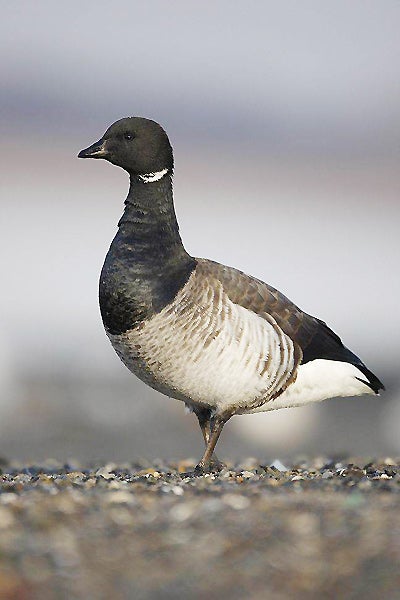Flock of geese missing en route to feeding ground

The hunt is on for a missing flock of one of the world's rarest birds.
The big freeze has brought an unusually large number of light-bellied brent geese to the Lindisfarne National Nature Reserve in Northumberland.
Around 4,000 geese have arrived at the island, which is used by the birds as a winter feeding ground, but the whereabouts of several thousand of them still remains a mystery.
The world population of these small geese is estimated at only around 6,000 individuals.
In the summer the birds breed in the Arctic on Svalbard and Franz Josef Islands with a few in north east Greenland, but all the birds leave their breeding grounds after they have nested to avoid the worst of the Arctic winter.
In most years, around half of the birds head to the UK and spend the winter at Lindisfarne, with the rest wintering in Denmark and together the two sites hold over 99% of the world population of the geese.
But during the big freeze the Danish wetlands froze over and the geese which arrived there were forced to abandon Denmark to find new feeding grounds.
The birds were expected to arrive at Lindisfarne but never touched down in Northumberland.
Natural England's Lindisfarne NNR reserve manager Andrew Craggs said he hoped that have found a safe haven elsewhere in Europe.
He said: "It is a sign of just how widespread the big freeze has been that these geese are present at Lindisfarne in such large numbers.
"The arrival of the geese is a treat for wildlife watchers, but it is a sobering thought that virtually the entire world population of these birds rely on only a couple of locations in Europe for their survival in winter.
"The Lindisfarne National Nature Reserve is part of an international network of special sites that have a vital role in the conservation of wildlife.
"These geese remind us just how important the North East of England is for wildlife that comes here from all points of the compass."
He said the severe winter had seen the largest recorded number of birds to arrive at Lindisfarne in years.
Three types of brent geese occur in Britain - the majority are the dark-bellied race (Branta bernicla), which breeds along the Arctic coasts of northern Siberia; the Svalbard population occurs in England regularly only at Lindisfarne; while small numbers of Canadian pale-bellied brent geese occur occasionally in the south west with the main population wintering in Ireland.
The Lindisfarne National Nature Reserve is managed by Natural England and covers more than 3,500 ha (36 sq km) of sand dunes, dune slacks, coastal grassland, saltmarsh and tidal mudflats along the Northumberland coast from Cheswick Black Rocks to Budle Point.
It is one of 222 National Nature Reserves in England, covering more than 92,000 hectares.
Join our commenting forum
Join thought-provoking conversations, follow other Independent readers and see their replies
Comments
Bookmark popover
Removed from bookmarks